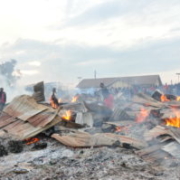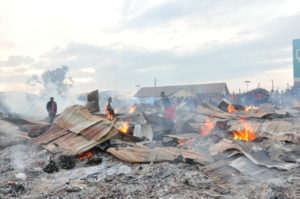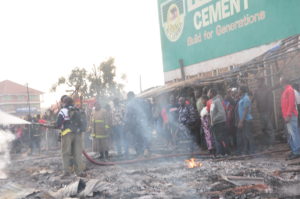Soroti City starts re-allocation of lock-ups to vendors at Soroti Modern Market
SOROTI – Authorities of Soroti City have embarked on re-allocation of lockups in Soroti Modern Market nicknamed as “New Jerusalem” constructed under Uganda Markets and Agricultural Trade Improvement Project (MATIP-2); after months of disagreement between vendors and city authorities.
The nine days exercise which commenced on Tuesday, August 31st, 2021 is being spearheaded by the Principle Community Development Officer, Damalie Asekenye who doubles as the Market and Agricultural Trade Improvement Project (MATIP) Officer.
According to the road-map, the lockup allocation exercise is expected to end September 8th,2021 and the vendors will commence their operations in the market on the 10th of this month.
This comes after months of disagreements between the market vendors and city authorities over the illegalities surrounding the first exercise.
The disagreement stemmed from reports that the market leaders led by George William Eriebat, had double allocated themselves lock-ups including their close relatives leaving out more than 2,000 people who had applied for space in the new market.
A number of vendors complained that the allocations were based on relations with the technical people and the majority refused to take up lockups allocated to them by the city authorities.
This forced the Resident City Commissioner (RCC), City Clerk, Ambrose Ocen and the City Mayor, Joshua Edogu to halt the allocation of Lock-ups.
After the process was halted, an independent committee was formed to investigate the allegations that Eriabat and his team had double allocated lock-ups to themselves.
During the investigations which lasted for a month, the committee found out that allegations raised by a section of vendors against the leadership of the Market vendors were true.
However, the Principle Community Development Officer (CDO), Damalie Asekenye told theCooperator that the issues that affected the first re-allocation exercise have been resolved amicably.
She said the ongoing lock-up allocation exercise is being conducted by a 24 man’s team representing the 12 sections in the market.
According to Asekenye, by September 1st, 2021, a total of 38 vendors from Solot-Avenue and Adams road had successfully got their lock-ups without any grievances registered.
“As per the Memorandum of Understanding (MOU) between the then Soroti Municipal Council and the vendors, the priority is given to the vendors (Landlords), their tenants, people operating businesses and those whose leases could have expired by the time of market construction,” said Asekenye.
Richard Opiding, the chairman allocation committee assured the vendors that their commitment is to see that the lock-up allocation is done in a transparent manner.
“My committee and I don’t want to repeat the same mistakes which were done by the leadership of the market vendors and top city management because those mistakes made the vendors protest the first allocations,” he told theCooperator.
Josephine Akayo, one of the smoked fish dealers applauded the government for giving Soroti City such a unique facility.
According to her, the market is not only a pride for Soroti district but Teso as a region.
“It will go a long way in creating job opportunities for vendors,” she summed up his happiness.
Meanwhile, Ambrose Ocen, the Soroti City Clerk said that the new market has 1,390 facilities, including stalls and retail stores which ought to be allocated to the low-income earners to operate inside the market, including the vendors.
“Absentee landlords who may want to buy space have no place here,” the City Clerk told theCooperator in an interview on Wednesday.
He highlighted that the market will boost development in Teso sub-region and Soroti in particular, hence making it a regional business hub.
https://thecooperator.news/why-roko-failed-to-complete-construction-of-mbarara-central-market/
Ocen added that Soroti Main Market will not only boost trade in Soroti but also local revenue collection in Soroti City hence improved service delivery to the city dwellers.
Soroti Main Market was constructed by TECHNO 3-Uganda Ltd at a tune of Shs 24 billion, with a loan acquired from African Development Bank (ADB).
It was commissioned by the President H.E Yoweri Kaguta Museveni on November, 2020.
Geoffrey Ettedu, the National Coordinator, Markets and Agricultural Trade Improvement Project (MATIP-2) said the markets constructed by the ministry in the districts of Hoima, Gulu, Moroto and Lira don’t measure to Soroti Modern Market in terms of scope, design and standard.
“Soroti market project is the biggest of all the markets constructed under the Market and Agricultural Trade Improvement Project (MATIP-2),” he added.
In addition to stalls and lockups, the new market has CCTV cameras linked to the Soroti Central Police Station, 500,000 litre water tank, butchery, chicken cages, cold rooms and service centres: tailoring, pharmacies, financial institutions and small-scale value addition units.
The new modern market also has prayer rooms, restaurants, day-care facilities, meeting rooms, and a Police station.
Soroti Modern Market is powered by solar energy for lighting to enable storage of fresh foods and vegetables to avoid losses caused by constant electricity blackouts in the city.
The facility is also connected to the solar water pumping system that is independent of the National Water and Sewerage Corporation.
Buy your copy of thecooperator magazine from one of our country- wide vending points or an e-copy on emag.thecooperator.news
The post Soroti City starts re-allocation of lock-ups to vendors at Soroti Modern Market appeared first on The Cooperator News.



